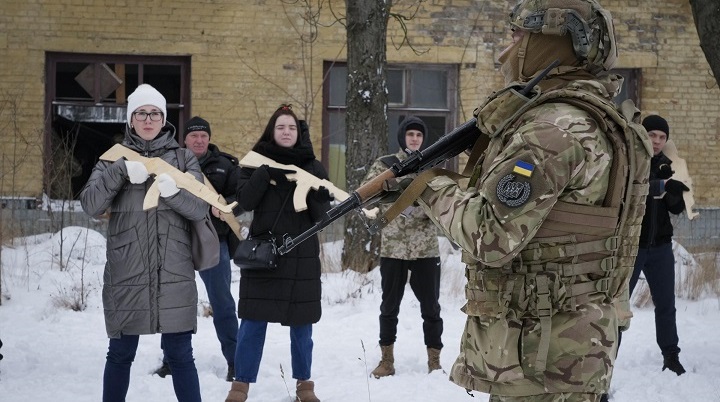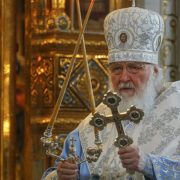
Many German gains of the end of the first Cold War could be lost. The possibility of a second Cold War in Europe is no longer farfetched and, to avoid it, Berlin should perhaps look at it right in the eye, and think of China.
Germany was the country that gained the most since the end of the Cold War thirty years ago. It regained the unity it lost in 1945, and it pushed Russia back over two “buffer-country” lines, the greatest distance from its unwieldy neighbor in its entire history.
The lines of buffer countries were those of the former Soviet empire, that joined the European Union (EU) and NATO, and the fledgling states emerging from the Soviet collapse, such as Belarus and Ukraine. Then, Germany saw before its eyes a huge prairie of possibilities to expand its increasingly accurate and efficient manufacturing industry, while other developed countries were chasing the new internet economy and exiting manufacturing.
Then there was Eastern Europe and Russia but also China, all anxious to buy the symbol products of the new wealth: the BMWs, Mercedes, Porsches, far more glittering and tangible than the ethereal latest services from the web – Google, Amazon, Facebook…
The rest of the EU was bound to Germany by the euro, by the ever-closer relations of financial and productive subordination to the virtue of German debt/GDP ratio, and by essential supply lines stretching to Italy and Spain but also France.
These relationships were growing stronger and more solid than those with America. Here the basis had been defense against the Soviet threat. But with the collapse of the USSR, it didn’t matter, since there were no longer existential threats. Or the US-NATO defense was abused, with the high cost and low performing deployments in Afghanistan or Iraq.
Moreover, there was the euro, separated from the dollar, and Washington’s increasing distraction by Asia, which was not a challenge for Germany but only a large market.
For Germany, the efficiency of its economy was the answer to any theoretical political trial. For Germany it was an ideal world, if Russia had not begun to change it by narrowing the buffer lines.
Thinner Buffers
Since 2008, Russia has eliminated or thinned the first line of buffer countries. Listing the events in no particular order, Russia has split and caged Georgia with a series of internal and external conflicts. It has successfully supported the Assad regime in Syria, strengthening itself in its port of Tarsus in the Mediterranean Sea. It aided the Benghazi faction in Libya; it foiled a democratic election in Belarus and virtually reannexed the republic. It detached Crimea from Ukraine and annexed it.
Russia also tried to expand into Azerbaijan supporting Armenian ambitions. It failed, but Armenia is now closer to Moscow. Moscow may have inspired a coup in Kazakhstan, and in practice extended his power throughout former Soviet Central Asia, thereby erasing any dreams of an alternative gas supply to Russia.
There was a prospect of bringing Kazakh or Turkmen gas to Europe and Germany with a pipeline through the Caspian Sea, Azerbaijan and Turkey. Instead, Russia wanted and wants to channel all that gas only through its pipelines to increase its political leverage with the EU and indirectly with the USA.
All this leaves Germany in a very different reality than thirty years ago. Russia is now much closer to German borders. It can also be a good thing because some of the countries returned under the strict protection of Moscow were considered almost bunglers and scoundrels, and it was so much better to talk directly with the Russians.
But the Russian extension to the west also sends the second line of buffer countries, those now in the EU and NATO, into turmoil and dwindles prospects of negotiations on energy supplies. If the Russian pipelines have no potential alternatives in Central Asian gas routed through Turkey, then Berlin is under a Russian monopoly.
Germans can console themselves by thinking that the Russians need German euros more than the Germans need Russian gas. But the reality is that the Russians have proven that they are willing to suffer for a political purpose so that they can take fewer euros. The Germans on the other hand can hardly do without even a drop of gas.
So, what can happen in the Ukraine affair for Germany?
The pro-Russian coup in Kazakhstan may show that Moscow does not want a neutral government in Kyiv, nor a buffer state, but a satellite country.
For Berlin, the idea of admitting into NATO a fragile and decomposed country, a “thief” of gas from the pipelines, like Ukraine, is certainly disturbing. But the de facto annexation of this immense land and the anxiety and apprehension it spins throughout Europe, with ramifications as far as Portugal, opens up possibly worse scenarios.
The ghost of a second Cold War in Europe, not only in Asia, arises again. Here Germany will want to avoid being in the front line again at all costs, and must protect itself. Russia may want guarantees, but similarly so does the rest of Europe.
Russia’s President Vladimir Putin’s move toward Ukraine, at the same time as the coup in Kazakhstan, opens up new and existential scenarios for Germany. The time when commercial economic integration could replace geopolitics is over.
If Germany does not oppose Russia in Ukraine, it could also Eastern Europe, it returns to the front line, and becomes a subject, not a leader, of the EU. The relationship with the US, today dialectic, becomes hierarchical again, because only America can guarantee German security from the Russians or from Polish, Romanian, and Baltic anxiety.
Germany cannot get out of its geography, much less out of the EU and NATO. It can try to play there, but Putin has changed his games.
Putin’s Miscalculations
In other words, Putin may have miscalculated. By pushing too hard on Ukraine, he found resistance and in the face of this resistance, he did not immediately withdraw, but insisted, so he is forcing Germany into choices it did not want to make.
Berlin would have wanted to maintain a special axis with Moscow over the other European countries, but this axis cannot exist in spite of the European countries. If it has to be in spite of them, Germany may be pushed to bend to the rest of Europe. It is unthinkable and not practical that it would choose Moscow against the Europe of which it is an integral part.
Here is the dilemma. Putin is in a corner, and coming out of the Ukraine game defeated could have heavy domestic consequences. Chaos in Moscow would be a jinx for Berlin. Germany may want an honorable compromise for Putin, but the East European countries may want to take this opportunity to push back the Russians and step out of their shadow with more certainty even at the cost of possible instability in Moscow.
Moreover, beyond the intentions of others, Putin himself hesitates by keeping troops on the border without letting them withdraw or advance. The more time that passes in this indecision, the weaker his hand becomes, and the more complicated the game and German desires also become.
German Chancellor Olaf Scholz then faces not a simple crisis in Ukraine but a complex redefinition of his country’s foreign and economic policy after thirty years, and he has no time, because Putin’s indecision does not help him.
That leaves, presently, the energy question. How does one survive or resist under threat from Putin’s gas policies? Still, Russian gas is indeed convenient, but now thanks to new shale technologies, the world has perhaps more oil and gas than mineral water.
Extractions have been reduced due to the economic crisis after Covid and production does not restart immediately, like turning on a faucet. But the gas is there and it’s a lot. The immediate problem is how to bring it to Europe physically.
If liquified American gas comes in, regasification plants must be equipped, but once that happens Russian gas may become redundant. Here the Russians have a window of only a few months to bargain with the Germans and the Americans on their blackmail, which actually is a bluff.
This, however, touches on webs of also legitimate personal and business interests that have been intertwined with Russian gas over the past decades. These entanglements today may cloud the vision of many in Europe and contribute to confusion, multiplying the risks of mistakes and accidents in Ukraine and its surroundings.
Finally, how the Germans will handle the Russians in Ukraine could become the foreplay of a more sensitive terrain – how Berlin (and EU) will handle China. So far Germany has been very good in keeping two issues apart – stern position of the press on human rights issues, and a very realistic approach to business.
Still, if things change with Russia, then they may change with China too. Priorities and goals are certainly differences between the two countries. Still, if a new era of geopolitics is looming and realistic geoeconomics is doomed, Germany may want to think hard about it. This is very important for China too. Perhaps Beijing should consider what it should do to keep economic and political relations with Germany and the EU on a fairly even keel when perhaps an even bigger storm is coming.






An independent Ukraine is acceptable to Russia. Ukraine as a satellite of US is not.
When a democratic regime in Kiev was replaced by the US led coup the first concern in Moscow was its naval base in Crimea. That was secured in a democratic way by a vote in the parliament of the autonomous province Crimea for independence and by a referendum in which the majority voted for accession to the Russian Federation.
A factor was an effort by the rump parliament in Kiev to enact that Ukrainian would become the only language in the contacts between the state and the citizens – which was not signed by the provisional president. Very convenient for Moscow. Did it pay for it?
The clearly anti-Russian attitude of the new regime opened the way not just for the departure of Crimea but also for an insurrection in the Donbass. That followed a month after the Crimea referendum. The rebels needed an air defense against helicopters and Su-25 ground attack aircraft. Russia provided shoulder launched anti air missiles and training for the operators and I guess radar aircraft were in the air to warn the operators that a target would appear in a certain direction. They succeeded in reducing the threat from these aircraft to a low level in a mere six months.
Late in June the rebels took a Buk Transporter-Erector-Launcher from a Ukrainian army base. That Buk TEL was
unable to launch any missile and that must have been know at the army HQ. When it was near Luhansk an An-26 was shot down and Kiev claimed it had been flying at an altitude of six km, out of reach of any weapon but large anti aircraft missiles and guns. Three days later MH17 was shot down with a missile of the type used by the Ukrainian army and Kiev promply accused the rebels. It also accused the population in the area of abusing the bodies of the victims and stealing their belongings. All of which proved to be false.
So it looks very much that it was the intention of Moscow when taking that Buk TEL for a joy ride for Kiev to shoot down an airliner, await a criminal trial and present its evidence. Whether that was the intention or not the MH17 trial in the Netherlands is nearing its end and Moscow is paying for a defender for one of the accused, to the surprise of the Dutch authorities!
What will be the result? One of the items produced by the prosecution and described by my Dutch newspaper NRC was a telephone call by one of the accused in which he said he needed a Buk launcher as soon as possible. Buk launchers did not and could not play a role in the defense of the rebels. There could be no plausible deniability when using weapons that needed well trained crews in a network of weapons and sensors and the vehicles wouldbe vulnerable to long range artillery fire. That item is clearly fake and there will be many more in the hundred thousand pages of evidence.
And then? It is well kown that vice-president Biden was deeply involved in US policy wrt Ukraine. Will we see a heading in a paper: ‘What did the vice-president know and when did he know it?’